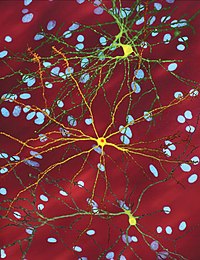
Photo from wikipedia
With the advent of promising, biomarker-directed, amyloid monoclonal antibody therapy for Alzheimer disease (AD),1 there is a need to understand the complex scientific, ethical, and practical implications related to biomarkers… Click to show full abstract
With the advent of promising, biomarker-directed, amyloid monoclonal antibody therapy for Alzheimer disease (AD),1 there is a need to understand the complex scientific, ethical, and practical implications related to biomarkers of neurodegenerative conditions,2 including how they can be used to determine the onset, progression, and subtype of these disorders. As the clinical use of AD biomarkers moves beyond specialized centers, and as they become widely used to identify, diagnose, and track the progression of dementia, it will be important to develop protocols to disclose the presence of AD biomarkers to patients.
Journal Title: Neurology
Year Published: 2023
Link to full text (if available)
Share on Social Media: Sign Up to like & get
recommendations!